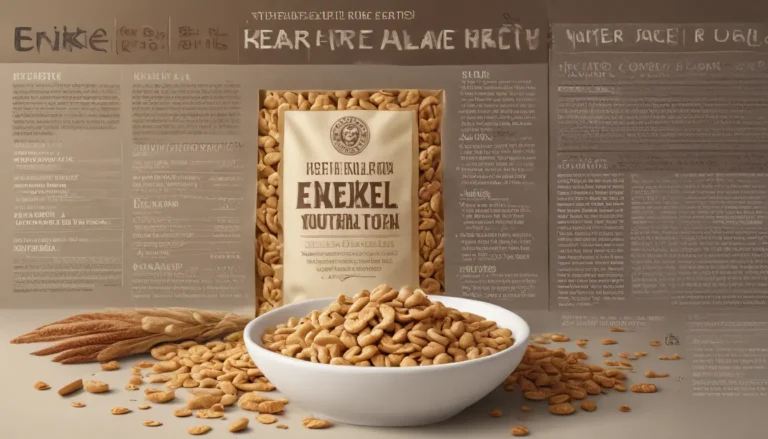The pictures in our articles might not always show exactly what the text is talking about. We use these images to make the article more interesting and eye-catching. They are there to add to the text, but not to replace it or show every detail.
Tater tots are a delightful snack enjoyed by people of all ages, offering a crispy outside and a fluffy inside. Before indulging in these tasty treats, it's essential to familiarize yourself with their nutrition facts. In this comprehensive guide, we will explore 15 key nutrition facts about tater tots, including their calorie content, fat and carbohydrate levels, vitamins, and minerals they contain. Whether you're a tater tot enthusiast or simply curious about their nutritional value, this article has everything you need to know.
Understanding Tater Tot Nutrition
Tater tots are a popular snack loved for their delicious taste and texture. However, it's crucial to understand the nutritional components of tater tots to make informed dietary choices. Here are some key takeaways to keep in mind:
- Tater tots are rich in calories and fat, but they also provide carbohydrates, protein, and small amounts of essential nutrients like vitamin C and iron. Enjoy them in moderation and pair them with fiber-rich foods for a balanced diet.
- When consuming tater tots, be mindful of their sodium content. Consider baking them instead of frying to reduce added fats and calories. While tater tots are cholesterol-free, they may contain allergens like wheat.
Dive into Tasty Tater Tot Nutrition Facts
Let's explore the nutritional profile of tater tots in more detail:
Tater Tot Calories
One serving of tater tots contains approximately 160 calories, making them a flavorful yet calorically dense snack option.
Tater Tot Fat Content
Tater tots are relatively high in fat, with each serving providing around 8 grams. Enjoy them in moderation to balance your fat intake.
Tater Tot Carbohydrates
A serving of tater tots offers about 15 grams of carbohydrates, providing a quick energy boost to keep you going throughout the day.
Tater Tot Protein
While not a significant source of protein, tater tots still contribute about 2 grams of protein per serving, supporting muscle function and repair.
Tater Tot Sodium
Each serving of tater tots contains approximately 380 milligrams of sodium. Monitor your sodium intake, especially if you have dietary restrictions.
Tater Tot Fiber Content
Tater tots are not a substantial source of dietary fiber, offering only about 1 gram per serving. Pair them with fiber-rich foods to meet your daily fiber needs.
Tater Tot Vitamins and Minerals
- Vitamin C: Tater tots contain a small amount of vitamin C, providing about 4% of the recommended daily intake.
- Iron: Each serving of tater tots contributes approximately 2% of the recommended daily intake of iron, essential for red blood cell production.
- Calcium: While not a significant source of calcium, tater tots offer 2% of the daily recommended intake per serving.
- Vitamin A: Tater tots contain a small amount of vitamin A, providing about 2% of the recommended daily intake, promoting vision health and immune function.
Tater Tot Sugar Content
Tater tots are relatively low in sugar, with only about 1 gram per serving, making them a better choice than many other fried foods loaded with added sugars.
Tater Tot Cholesterol and Allergen Information
- Cholesterol: Tater tots are cholesterol-free, suitable for those on a low-cholesterol diet.
- Allergens: Tater tots typically contain wheat ingredients and may be fried in oil, potentially posing a concern for individuals with wheat or gluten sensitivities and certain allergies.
Tater Tot Serving Size and Cooking Methods
- Serving Size: A typical serving of tater tots is around 9 pieces, but always check the packaging for specific serving guidelines.
- Cooking Methods: Tater tots can be baked or fried, with baking being a healthier option to reduce added fats and calories compared to frying.
Making Informed Choices with Tater Tots
In conclusion, tater tots can be enjoyed in moderation as part of a balanced diet. While they may be high in carbohydrates, fat, and sodium, healthier cooking methods can mitigate their nutritional impact. It's essential to pair tater tots with nutritious options like fresh vegetables or lean proteins to enhance your overall nutrient intake.
Remember, moderation is key when indulging in tater tots. By balancing them with nutrient-rich foods and maintaining a well-rounded diet, you can savor these tasty treats guilt-free.
Frequently Asked Questions
-
Calories: Tater tots can vary in calorie content, typically ranging from 160 to 200 calories per serving.
-
Vitamins and Minerals: While tater tots provide some essential nutrients, they are not a significant source of vitamins and minerals.
-
Fat Content: Tater tots can be high in fat, especially when deep-fried. Choosing baked or air-fried options can lower the fat content.
-
Gluten-Free: While most tater tots are made from potatoes, some may contain wheat-based ingredients. Check labels for gluten-free options if needed.
-
Healthy Diet: Tater tots can be part of a healthy diet when consumed in moderation and paired with nutrient-rich foods for a balanced meal.
Empowering You with Trusted Information
Our commitment to delivering accurate and engaging content drives us to provide you with valuable insights into tater tots nutrition. Every fact on our site is sourced from real users like you, ensuring diverse perspectives and reliable information. Our dedicated editors meticulously review each submission to uphold the highest standards of authenticity. Explore and learn with confidence, knowing that our content is not only fascinating but also trustworthy. Trust in our dedication to quality as you navigate the world of nutrition.
As you embark on your journey to make informed dietary decisions, remember to savor tater tots responsibly while embracing a diverse and balanced approach to nutrition. Enjoy the delightful taste of tater tots with a side of knowledge, making each bite a flavorful and enriching experience.






